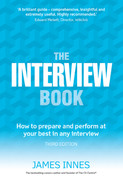Handling rejection
It is a sad fact of life that no matter how capable, qualified and experienced you are most interviews will result in rejection for one reason or another. So you had better get used to it! Nearly everybody suffers a few such setbacks when they are hunting for a new job; many job hunters are regularly shot down in flames. Remember: It just wasn’t your destiny.
If you were not successful, try to treat the interview as a learning experience. A real, live interview is the very best form of interview practice you can get. We all make mistakes; make sure that you use them to your advantage for your next interview.
If you had your heart set on a particular opportunity and have been through the highs and lows of being invited to a first interview and then to a second or maybe even an assessment centre, then it can be very demoralising to find out the job went to someone else and all your efforts were for nothing.
Or were they…
Never say never
If you’re a philosophical sort of person your initial reaction to receiving a rejection from a prospective employer might be to conclude that it’s the end of this particular road and you need to turn your attentions to other possibilities you’ve got on the go.
However, call me stubborn, but I and many other recruitment professionals still recommend following up on such a rejection with a brief but important letter.
Allow me to explain why.
Building bridges
Having taken the time to build bridges with this organisation, you’d be wise to maintain those bridges as best you can. You never know when your contacts might come in handy later in your career.
- You might end up getting a job where you deal on a regular basis with this organisation.
- You may have missed out on the current vacancy but there could be another one in just a few weeks’ time.
- What if the person who won the job subsequently turns it down?
TOP TIP
Having invested this much in your relationship, it makes sense to seize the opportunity to spend a few more minutes developing that relationship even further.
Maintaining a positive attitude
The way you approach writing this letter is very important. You might feel a degree of resentment for their having made you jump through lots of hoops only to disappoint you, but you certainly don’t want that kind of negative emotion to come through in your letter.
There isn’t (or at least there shouldn’t be) anything personal about the decision: It’s just business. You are not being rejected as an individual; your candidature for this particular vacancy is being rejected. In many cases it could be an extremely arbitrary decision; if an employer is faced with a number of high-quality candidates then it can be very hard to choose between them. Indeed, sometimes there is so little to choose between candidates that, more than anything, success or failure is down to luck.
It is fine to express your disappointment but you should definitely avoid sounding bitter. A negative attitude is unlikely to make a good impression.
You should attempt to extract some constructive feedback from them to help you with future applications you make. Most recruiters won’t volunteer this information; you’ll have to ask for it. You might just get back the usual canned response that ‘it was an extremely difficult decision’, etc., etc. You might get no reply whatsoever. But you might just get some really useful advice, which could enable you to address any weaknesses or rectify any mistakes so you have a greater chance of success the next time around.
Down but not out
You’re also demonstrating that you’re somebody who doesn’t like to lose and who will do their utmost to make sure they’re less likely to lose out again in the future.
Remember: There is a job out there with your name on it; if no one has yet recognised your star quality, it’s up to you to dazzle them!
Of course, if you’re having difficulty getting yourself invited to interview in the first place, then it may very well be that your CV needs some work.
The CV Book
If you would like to learn more about CV writing, then please take a look at my best-selling book on the subject, The CV Book: How to Avoid the Most Common Mistakes and Write a Winning CV. You can place your order for a copy via our website: www.jamesinn.es
